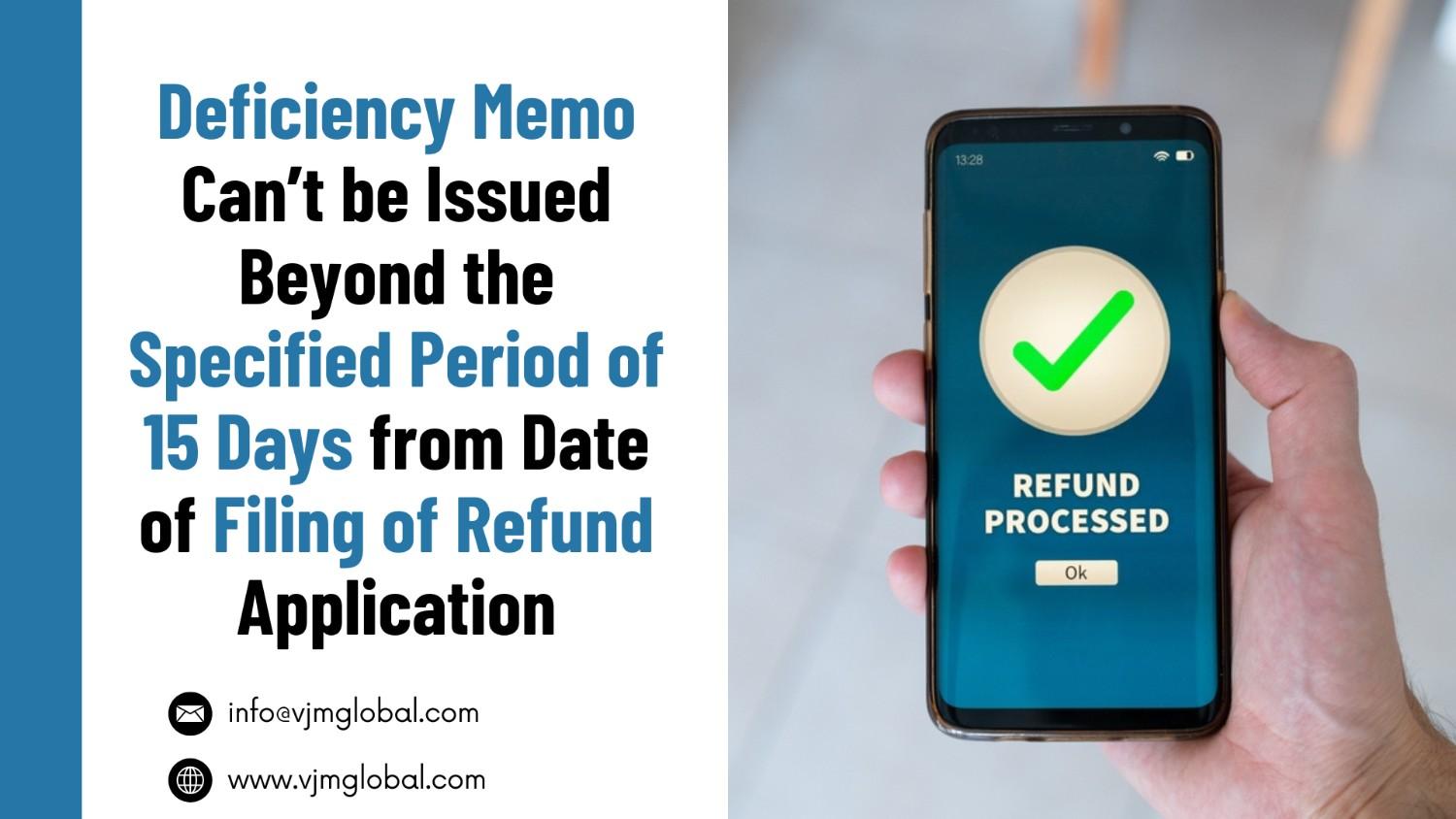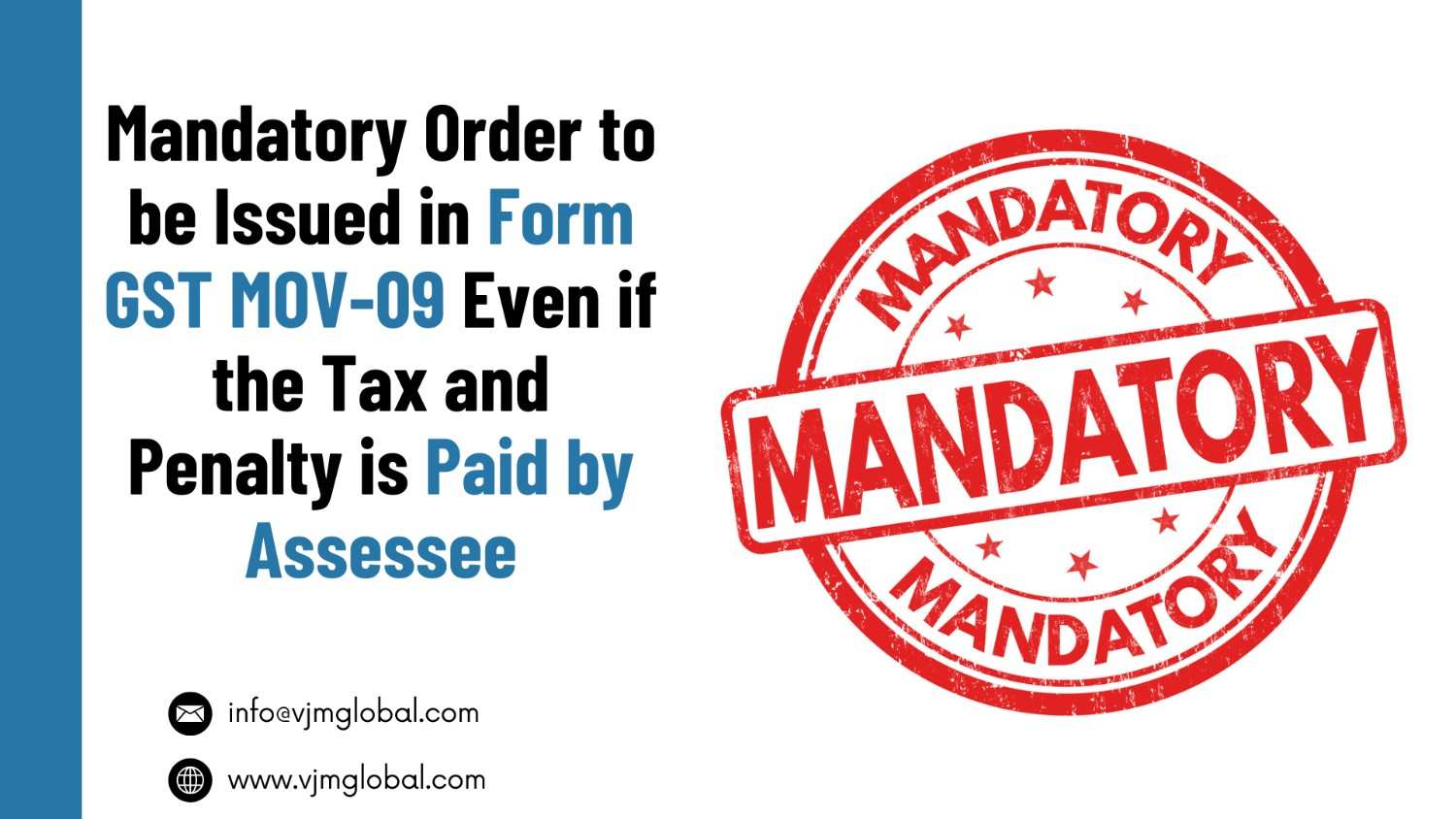Held by
Hon’ble Supreme Court of India
In the matter of
M/s ASP Traders Vs State of Uttar Pradesh & Sons
(CIVIL APPEAL NO. 9764 OF 2025)
M/s ASP Traders (“The Appellant”) is registered in the state of Karnataka and sent a consignment of goods to Delhi. During transit, Such goods were loaded in another vehicle, and 7 bags went missing. Such a vehicle was detained by the Mobile Squad in Jhansi. The Mobile Squad issued the SCN in Form GST MOV-07 under Section 129(3) of the Act. The Appellant furnished a detailed reply against such notice. The Appellant then deposited the alleged tax amount through form GST DRC-03. The Respondent released the goods vide order issued in Form GST MOV-05. However, no final order was issued in Form GST MOV-09.
The Appellant filed an appeal before the Hon’ble High Court, wherein it was held that Once the proceedings are concluded in terms of Section 129(5) of the Act read with Rule 142(3) of the Rules, no mandamus can be issued to the respondent to pass an order under Section 129(3) of the Act. Accordingly, the Appellant filed an appeal before the Hon’ble Supreme Court of India.
Hon’ble Supreme Court held that it is a well-settled principle that every SCN must culminate in a final, reasoned order. Section 129(5) of the Act provides that proceedings shall be deemed to be concluded upon payment of tax and penalty; however, it cannot be interpreted to imply that the assessee has agreed to waive or abandon the right to challenge the levy – a right that is protected by the very enactment itself. The term “conclusion” merely signifies that no further proceedings for prosecution will be initiated. It does not absolve the responsibility of the proper officer to pass an order concluding the proceedings. Therefore, the proper officer is duty-bound to pass a formal order in Form GST MOV-09 and upload a summary thereof in Form GST DRT 07 as mandated under Rule 142(5) and the Circular dated 13.04.2018, to enable the taxpayer to avail the appeal remedy as per law. Even assuming that the payment was made by the appellant, voluntarily or otherwise, the proper officer could not be absolved of the statutory obligation to pass a reasoned order in Form GST MOV-09 and upload the corresponding summary in Form GST DRC-07.
Therefore, the impugned order passed by the High Court is set aside, and the Respondent is directed to pass a reasoned final order under section 129(3) of the Act, in Form GST MOV-09 and upload the summary thereof in Form GST DRC-07.
1. Brief Facts of the case:
- M/s ASP Traders (“The Appellant”) is a registered dealer in the state of Karnataka.
- On 14th January, 2022, the Appellant consigned 17850 Kgs of dry Arecanut of INR 51.73 Lacs (255 Bags) to Delhi. During Transit, the goods were loaded in another vehicle. However, only 248 bags were loaded, and 7 bags went missing from the original consignment.
- On 17th January 2022, such a vehicle was detained by the Mobile Squad in Jhansi.
- The following notices and documents were issued:
- GST MOV-01: Driver’s statement was recorded.
- GST MOV-04: Physical Inspection report was issued on 20th January, 2022;
- GST MOV-06: Detention order was issued on 20th January, 2022;
- GST MOV-07: Notice u/s 129(3) of the CGST Act (“The Act”) was issued on 21st January, 2022, highlighting various discrepancies;
- Detailed Reply: The Appellant furnished a detailed reply on 24th January, 2022, denying all allegations;
- GST DRC-03: The Appellant deposited INR 7,20,440/- towards IGST as indicated in SCN on 27th January, 2022.
- GST MOV-05: The detained goods were released on 27th January, 2022.
- However, despite the release, no final order was issued by the mobile squad u/s 129(3) of the Act.
- On requesting for final order in GST MOV-09, the Mobile Squad intimated that the Appellant’s representative orally requested for withdrawal of reliance and the release of the vehicle. Therefore, no further proceedings were deemed necessary.
- Accordingly, the Appellant approached the High Court for the following reliefs:
- A direction to the Respondent to furnish a copy of the order passed under Section 129(3) in pursuance of notice issued in Form GST MOV-07;
- A direction to the Respondent to pass a speaking order under Section 129(3) after affording an opportunity of hearing.
- Hon’ble High Court held that:
- A notice u/s 129(3) of the Act was issued. Pursuant thereto, the petitioner deposited the amount on his own in Form GST DRC-03 and intimated the respondent.
- The respondent issued the order in form GST DRC-05.
- Accordingly, the proceedings in respect of the notice issued under Section 129(3) of the CGST Act stood concluded as per Section 129(5) of the CGST Act.
- Therefore, the relief sought by the petitioner cannot be granted since the matter is concluded as per legislative mandate.
- Once the proceedings are concluded in terms of Section 129(5) of the Act read with Rule 142(3) of the Rules, no mandamus can be issued to the respondent to pass an order under Section 129(3) of the Act.
- Therefore, the Appellant filed an appeal before the Hon’ble Supreme Court of India.
2. Relevant Legal Extract
Relevant legal extract of the Act is reiterated below for ready reference:
- Section 129 of the CGST Act:
“129. Detention, seizure, and release of goods and conveyances in transit:
…
(3) The proper officer detaining or seizing goods or conveyances shall issue a notice specifying the tax and penalty payable and thereafter, pass an order for payment of tax and penalty under clause (a) or clause (b), or clause (c).
…
(5) On payment of the amount referred to in sub-section (1), all proceedings in respect of the notice specified in sub-section (3) shall be deemed to be concluded.
..”
- Rule 142 of the CGST Rules, 2017:
“142. Notice and order for the demand of amounts payable under the Act.
…
(3) Where the person chargeable with tax makes payment of tax and interest under sub-section (8) of section 73 or, as the case may be, tax, interest and penalty under sub-section (8) of section 74 within thirty days of the service of a notice under sub-rule (1), or where the person concerned makes payment of the amount referred to in sub-section (1) of section 129 within fourteen days of detention or seizure of the goods and conveyance, he shall intimate the proper officer of such payment in FORM GST DRC-03 and the proper officer shall issue an order in FORM GST DRC-05 concluding the proceedings in respect of the said notice.
…
(5) A summary of the order issued under section 52 or section 62 or section 63 or section 64 or section 73 or section 74 or section 75 or section 76 or section 122 or section 123 or section 124 or section 125 or section 127 or section 129 or section 130 shall be uploaded electronically in FORM GST DRC-07, specifying therein the amount of tax, interest and penalty payable by the person chargeable with tax.”
3. Contention of the Appellant
The Appellant contended that:
- It is a settled position in law that every show cause notice must culminate in a reasoned final order to enable the affected person to avail all statutory remedies.
- Payment of penalty cannot be treated as voluntary under Form GST DRC-03, as no show cause notice in Form GST DRC-01 was ever issued requiring the appellant to make such a deposit.
- The respondent authorities failed to follow the mandatory procedure prescribed under Rule 142 of the CGST Rules.
- Further, even if it is assumed that the penalty was paid voluntarily to secure the release of the goods, the Respondent was still under a statutory obligation to pass an order in Form GST MOV-09 as clarified in Circular No.41/15/2018-GST dated 13.04.2018.
- Section 129(5) merely states that the proceedings shall be deemed concluded upon payment of the penalty, and does not dispense with the requirement of adjudication, once a notice under section 129(3) has been issued.
- For proper legal closure, a final order in Form GST DRC-07 and GST MOV-09 must be issued.
- Final order is required to preserve the taxpayer’s right of appeal under section 107 of the Act.
- Also, imposition of penalty has wider implications, including possible consequences in future adjudication or enforcement proceedings under the CGST Act, 2017.
- In the absence of a formal order, the statutory right of appeal under Section 107 becomes illusory.
- Therefore, the Appellant prayed that the impugned order of the High Court be set aside, and appropriate directions be issued to the respondent authorities to pass final orders in Form GST MOV-09 and GST DRC-07.
4. Contention of the Respondent:
The Respondent contended that:
- Section 129(5) stipulates that upon payment of the amount under Section 129(1), “all proceedings in respect of the notice specified in sub-section (3) shall be deemed to be concluded,” and thus, no further order is necessary. The same is also confirmed by Rule 142(3) of the CGST Rules.
- The appellant could have avoided withdrawing objections and instead opted to secure the release of goods by furnishing security under the Act.
- In the present case, Section 129(5) is explicit, and the appellant cannot now be permitted to reopen concluded proceedings.
5. Analysis by Hon’ble Supreme Court of India:
- The issue that arises for consideration in this appeal is whether, upon payment of tax and penalty by the appellant within the time stipulated in the notice under section 129(3), the proper officer is still mandatorily required to pass a final order under section 129(3), or whether the deeming fiction under section 129(5) dispenses with such requirement.
- As per Rule 142(3), on payment of tax and penalty under section 129(1), intimation shall be given in Form DRC-03, and the proper officer shall issue an order in Form DRC-05 concluding the proceedings. Subrule (5) mandates uploading a summary of the final order in Form GST DRC-07.
- As per Circular No. 41/15/2018-GST dated 14th April, 2018, upon payment of tax and penalty under Section 129(1), the proper officer must issue the release order in Form GST MOV-05. Additionally, the officer is required to pass a formal order of demand in Form GST MOV-09 and upload it on the common portal. A summary of this order must be uploaded in Form GST DRC-07, so that the demand is recorded in the taxpayer’s electronic liability register.
- In the present case, the respondent released the goods and vehicle by passing a discharge order in Form GST MOV-05. However, no final order was passed, according to the said notice issued under Section 129(3) of the CGST Act.
- The appellant pleaded that due to business exigencies, they paid the tax and penalty and secured the release of the goods and vehicle detained. However, such a payment cannot be construed as an admission of liability. The Payment was made under protest, and the appellant had intended to contest the matter. Therefore, the proper officer was bound to pass a speaking order under section 129(3), to enable the appellant to exercise their statutory right of appeal.
- The respondent asserted that the payment was made voluntarily by the appellant and that the appellant had withdrawn the objections earlier filed. Accordingly, they stated that in terms of section 129(5), all proceedings stood concluded, and no further order was required to be passed.
- The discharge order (GST MOV-05) merely records that the detained goods and vehicle were released upon payment of the proposed tax and penalty. It makes no mention of any withdrawal of objections or of the conclusion of proceedings initiated under Section 129(3) of the CGST Act, 2017.
- It is a well-settled principle that every SCN must culminate in a final, reasoned order.
- Section 129(5) of the Act provides that proceedings shall be deemed to be concluded upon payment of tax and penalty; however, it cannot be interpreted to imply that the assessee has agreed to waive or abandon the right to challenge the levy – a right that is protected by the very enactment itself.
- The term “conclusion” merely signifies that no further proceedings for prosecution will be initiated. It does not absolve the responsibility of the proper officer to pass an order concluding the proceedings.
- Therefore, the proper officer is duty-bound to pass a formal order in Form GST MOV-09 and upload a summary thereof in Form GST DRT 07 as mandated under Rule 142(5) and the Circular dated 13.04.2018, to enable the taxpayer to avail the appeal remedy as per law.
- The language of section 129(3) is categorical in stating that the officeall issue a notice… and thereafter, pass an order”. The use of the words “and thereafter” reinforces the mandatory nature of passing a reasoned order, regardless of payment, particularly where protest or dispute is raised.
- Also, the payment by an assessee will not absolve the responsibility of the proper officer to pass an order justifying the demand of tax and penalty.
- The constitutional mandate under Article 265 of the Constitution, no tax can be levied or collected except with the authority of law. There is not only a bar against levy but also against collection.
- Therefore, even assuming that the payment was made by the appellant, voluntarily or otherwise, the proper officer could not be absolved of the statutory obligation to pass a reasoned order in Form GST MOV-09 and upload the corresponding summary in Form GST DRC-07.
- Compliance with these procedural requirements is essential not only for ensuring transparency and accountability in tax administration but also for safeguarding the taxpayer’s appellate rights under the CGST Act, 2017. Such adherence agrees with the constitutional mandate under Article 265 of the Constitution of India.
6. Final Order
Hon’ble Supreme Court of India held that:
- The impugned order passed by the High Court is set aside.
- The Respondent is directed to pass a reasoned final order under section 129(3) of the Act, in Form GST MOV-09, after granting an opportunity of being heard as mandated under Section 129(4), and upload the summary thereof in Form GST DRC-07 within one month from the date of receipt of a copy of this judgment.
- Thereafter, it shall be open to the appellant to pursue appropriate legal remedies against such order, by law.













